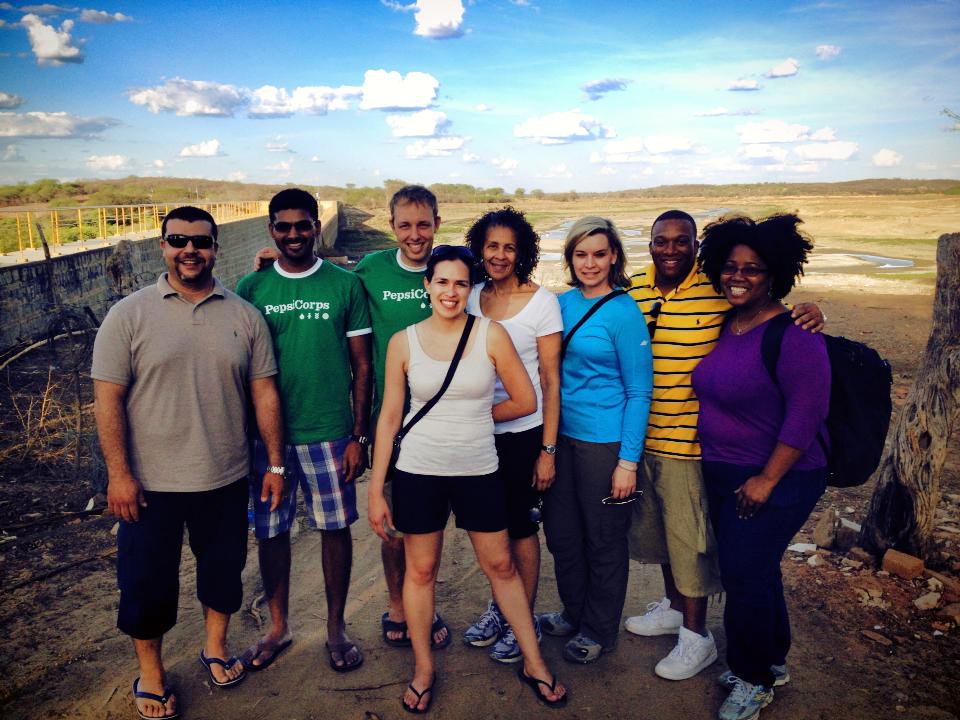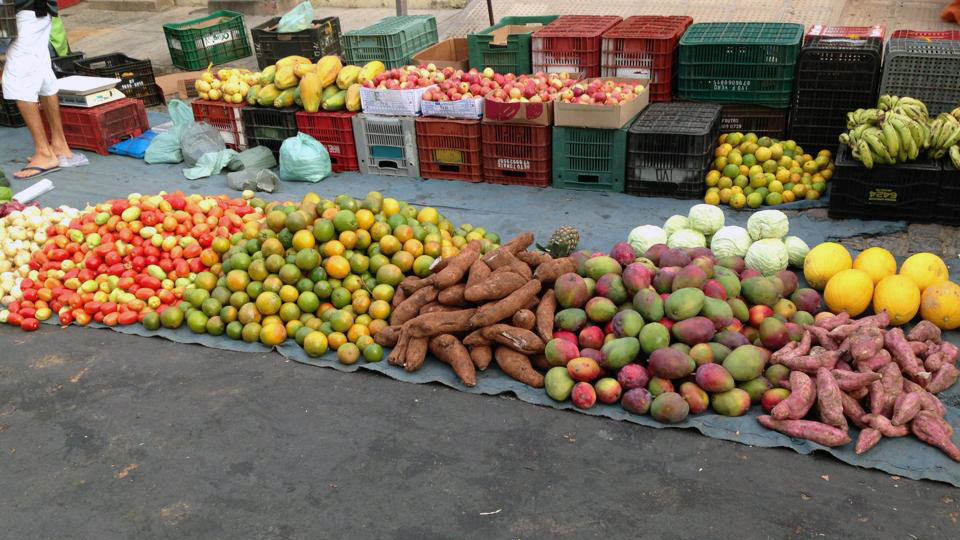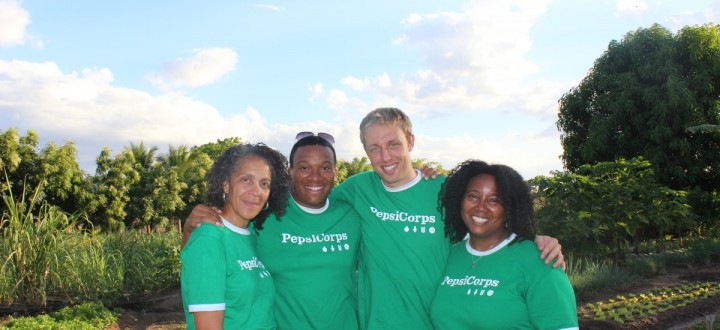Like every day, today is sunny and hot; a lack of rain has made the ground dusty and dry. At ten o’clock in the morning, it is already 102 degrees with humidity. Sheltered from the sun under a large mango tree, two farmers, Valmir and his wife Edna, discuss the challenges of sustainable agriculture in Afogados da Ingazeira, Brazil.
“To grow crops in these conditions is only for the few” says Valmir. “I used to be able to grow five boxes of passion fruit. Today I can’t even grow enough to make my own juice.”
When people think of Brazil, most envision incredible beaches and lush vegetation on the Amazon. In Afogados, however, this couldn’t be farther from the truth. Despite a three-year drought and severe reductions in growing capacity, this farm is one of the most successful in the region, something the couple attributes largely to smart-business instinct and their organic growing practices. We stand under that tree for an hour, chatting about their business. Finally we ask if there is anything else we could do to help. Valmir smiles and looks to the sky: “Make it rain.”

The entire PepsiCorps Brazil team.
I, along with seven other PepsiCo employees from around the world from various business functions, have been selected to participate in PepsiCorps, a one-month leadership opportunity designed to live out our company’s Performance with Purpose mission. The experience is a once in a lifetime opportunity that will broaden our global network, provide a new perspective of the world we live in, and ultimately allow each of us to leverage our business background to make a difference in the local community. Our team is located in the semi-arid region of the Pajeú in a town called Afogados da Ingazeira, a six-hour drive west of Recife, Brazil.
My sub-team of four is supporting the local office of Diaconia, an NGO that advocates for public policies that promote and defend civil rights to transform society. This office specializes in providing food and water security to the people through technical expertise on growing crops in a semiarid climate, a trusted partner to 50 organic farms in the region. During our month in Afogados, we are seeking to help Diaconia by develop a marketing strategy designed to increase the supply and demand of organic fruits and vegetables in Afogados da Ingazeria.
Our research showed that a number of factors influence the demand for organic produce in and around Afogados. Organic produce has reached an 88 percent household penetration but enjoys little loyalty, driven by a lack of availability, poor variety and for businesses, an unreliable supplier network. Shoppers and inorganic farmers had a very shallow knowledge of the health and environmental benefits of eating and growing organic produce. Only loose guardrails existed to regulate the certification of organic produce and some consumers wondered if what they were eating was in fact organic.

Matt spends a free morning with new friends in Afogados.
To combat these challenges, we developed a two-tiered strategy, one targeted towards farmers that would improve the supply and the other targeted towards shoppers that would help strengthen the demand.
Organic is more than just a method of growing, it’s a brand in itself. In Afogados, the basics of branding were non-existent. Branding with a consistent mark would help establish credibility for all organic farmers. The team developed an ‘organic’ logo, slogan and would establish awareness at the point of purchase, the local farmers market.
In addition to branding, the team recommended that tighter guardrails be implemented to prevent non-organic farmers from selling their products as organic. Diaconia engaged the local organic farmers association to help lead this effort. Interestingly, in isolation and often unannounced to each other, different groups visited organic farms to ensure they were complying with organic standards. The farmers’ association could centralized enforcement with a consistent approach.
Finally, sales of organic products needed to be tracked. Setting objectives and tracking progress required an accurate understanding of the status quo.
Go to Market Structure
A more reliable supply chain could enable high-volume buyers, like local restaurants to purchase organic foods. Though organic farmers in the region were a part of an association, they often acted independently of one another, making it difficult to meet the demands of end consumers and local businesses. By acting together as a cooperative, they could draw on each farm’s supply to meet demand. We recommended they model themselves after a very successful, neighboring organic farmers cooperative and sell to the public as one identity instead of as individual farmers. In this scenario the cooperative would buy from the farmers and the cooperative would sell to the public. The profits or losses for the year would be split among the members.

Local produce at the farmers market in Afogados.
The Supply Problem
With the drought, an organic farmer couldn’t just produce more. Many crops had been lost and they were producing as much as they possibly could with the little water they had. For organic farmers, the opportunity was to use their existing capacity more effectively. We analyzed sales data and unit pricing from non-organic farmers to make recommendations on what organic farmers should focus on growing in order to increase market share and make more money.
Yet, in reality, converting non-organic farms to organic offered the greatest opportunity to increase the supply of organic produce. This conversion was an intensive process. The team developed a conversion incentive program complete with extensive training from successful organic farmers, labor, and funding support.
The PepsiCorps team learns how to plant fruit trees in the local community of Queimada Nova.
The Demand Problem
The town’s two nutritionists helped us outline the benefits of eating organic to shape the basis of our campaign. They were enormous supporters of organic food. By leveraging trusted experts, we sought to educate shoppers on the benefits of eating organic foods for their family and the environment. Most people wanted organic, they just couldn’t get it, a good problem to have. When asked, “What’s most important when buying fruits and vegetables?” 46 percent of consumers listed ‘organic’ as the number one factor, ahead of ‘appearance’. Despite the desire, organic consumption had little loyalty; people made the switch between organic and non-organic products without much thought.
Despite our efforts to increase both supply and demand of organic produce, we could not ignore the bigger problem the drought posed for the region. Ironically, Brazil has the most renewable fresh water on the planet. Yet, in Afogados da Ingazeira, the dam is almost completely empty and local experts suggest that the drought will continue for at least three more years. The community continues to persevere with enormous strength, digging wells in search of ground water and perfecting their semiarid farming technique, but these solutions can only last so long.
During our time in Afogados da Ingazeira, light rain drops fell for a few brief moments, before the clouds passed and the sky cleared.
Read Part II of the PepsiCorps Lives Performance with Purpose in Brazil Series here.
Matt Gould
Matt Gould is the Gatorade Marketing Manager for Canada. He has worked with PepsiCo for over six years. Matt has a bachelor of commerce from McMaster University and has studied international business at the Norwegian School of Management in Oslo. In his love for travel, Matt has extensively explored Southeast Asia. He lives with his wife Ashley in Toronto.





